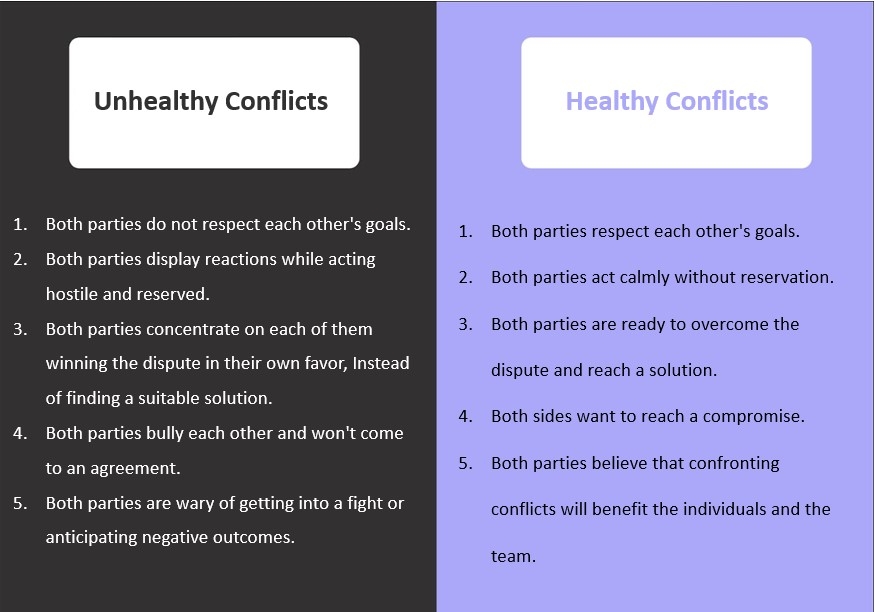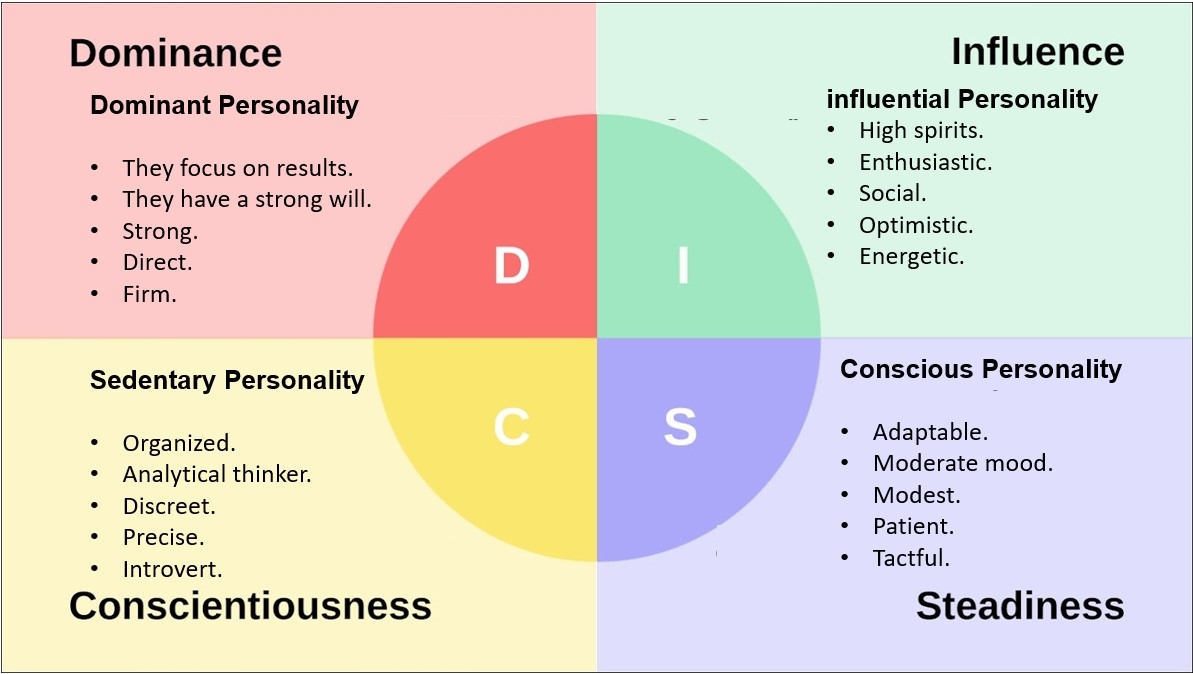5 Essential Conflict Resolution Skills Every Manager Needs
Many of us associate conflict with feelings such as fear, shame, and frustration. Therefore, we do our best to avoid them running away from these emotions, so we try to be nice to people, agree with what they say without conviction, or avoid talking altogether. However, these behaviors are not productive.
When we completely avoid conflict, we don't get the feedback and ideas needed to improve ourselves and our relationships. Therefore, managers must learn to accept conflicts and productively manage them to come up with new conversations and perspectives.
The conflicts we manage effectively build teams, as they lead to innovative and collaborative discussions that are essential to promoting business success.

When managers can get their team to see conflict as a tool for sharing ideas, and allow everyone to hear each other, it will become an effective form of communication, rather than an intimidating argument. Conflict management is one of the most difficult skills for managers. Therefore, to help you master the art of conflict management, we've listed five essential skills to successfully lead your team when conflict arises.
Using Emotional Intelligence in Conflict Resolution
Your emotional intelligence skills are closely related to your ability to manage and resolve conflicts. Emotional intelligence is defined as the ability to identify and manage your own emotions and the feelings of others around you.
However, when you master working with it, you can understand the reactions of others which enables you to identify their emotions, what causes them, and how you can handle the situation in light of the relevant emotional responses. Emotional intelligence is divided into five categories:
- Internal Motives: It refers to the motivations that drive us towards achieving goals for personal reasons, not to obtain rewards and appreciation.
- Sympathy: It means the ability to feel what others feel, and understand their viewpoints.
- Self-Awareness: Self-awareness is about understanding yourself.
- Self-Regulation: It is the ability to manage your emotions and impulses.
- Social: It refers to your social skills and your ability to manage relationships effectively.
Effective conflict resolution depends on each of these five elements. You must be able to interact socially, control your emotions, and communicate effectively to manage conflicts effectively. For example, if someone says something you don't buy into or agree with, self-regulation can help you avoid losing control and starting a toxic argument.
Dealing with conflicts also requires being able to see things from other people's perspectives, because it enables you to validate the story by hearing it from their perspective. The overlap between the components of emotional intelligence and the skills needed to overcome conflicts shows that enhancing emotional intelligence is the first step to enhancing the skill of conflict resolution.
Taking the Time to Understand Your Team and Their Needs
The ability to comprehend and manage various personality types at work is a prerequisite for building a successful team. Gaining a thorough understanding of your team members' personalities will help you understand what drives each one of them, as well as how to calm them down or bring them out of their shells.
Simply put, you will be better able to create a work environment that works for your team members if you have a better understanding of the various personalities on your team and how to interact with them.
The DISC tool provides the best framework for comprehending the various personality types of your team members. It is an acronym in the English language made up of the initials following words:
- Dominance.
- Influence.
- Steadiness.
- Conscientiousness.

The goal of this tool is to give teams a common language to improve their understanding and skills in communicating with each other, now let's dive into each of these four personalities a bit more:
1. Dominant Personality
This person is quick and direct. So when you find yourself in conflict with a dominant personality, pay attention to the following key points:
- When communicating with a controlling personality, it's best to keep your words short and to the point.
- It's best to keep your words short and to the point when communicating with a dominant personality,
- Focus on goals and what needs to be done.
- A dominant personality likes to take charge, so give these individuals space to voice their opinions and concerns.
2. influential Personality
People with this personality are very friendly, enthusiastic, charming, and energetic. Therefore, when you find yourself in conflict with an influential personality, pay attention to the following key points:
- Influential people love recognition, so try to praise the ideas or opinions they bring to you or the team.
- People with this personality feel socially rejected, so always make sure to acknowledge the efforts of influential individuals and make sure they feel valued within the team.
- Influential people are talkative and often have a lot to say, so make sure you give them space to listen to them and allow them to express their opinions and concerns.
3. Sedentary Personality
People with this personality tend to be slower paced than the dominant and influential personality, but they can be relied upon. This makes them effective team members. Therefore, when you find yourself in conflict with a sedentary personality, pay attention to the following key points:
- Sedentary people want an environment of support and cooperation, so always take the time to thank them for their work and make an effort to show that you are always willing to help them.
- Since people with this personality need more time, give them the time and space to respond to your questions and concerns.
- Finally, they avoid change, so be willing to give them space to deal with new things and show them that you are ready to help them as they take on new positions.
4. Conscious Personality
Conscious people also like to take their time, as do sedentary people, but they are people who think analytically and rely on data. So whenever you find yourself in conflict with a self-conscious person, pay attention to the following key points:
- Conscious people are logical and organized, so give them time to analyze and talk about their viewpoints.
- Given their reliance on data, you need to demonstrate to the informed person that you are looking at the problem objectively, so make sure you focus on the facts in the first place.
- People with a conscious personality tend to be withdrawn and overly critical of themselves, so engage them in conversations by asking them open-ended questions and praising them for their good ideas to help them recognize their strengths.
Creating Team Rules to Ensure Effective Communication
Team members need to understand how to talk to each other to successfully navigate conflicts. The best way to do this is to create rules that the whole team follows when a disagreement occurs. Creating communication systems through these rules sets standards by which team members communicate smoothly.
Therefore, when team members know what is expected of them and others, they will interact more naturally. In other words, when you set rules for disagreements, you give everyone common ground to draw on.
Here is an example of successful conflict rules that you can guide and use on your team:
- Always encourage your team members to ask questions.
- Don't allow your team to underestimate easy issues, or they will do the same thing later too.
- Remind your team members to expect the best intentions when sending and receiving messages.
- Take the time to arrange a meeting when there are larger issues that need to be discussed.
- When facing a conflict, start by defining the problem, then presenting the facts.
- Make sure you define an end goal you want to achieve from the discussions to avoid wasting everyone's effort.
- Create a conflict "contract" that everyone can sign to understand what each party needs to do to help the other.
- Always follow up with the team to make sure a solution is reached.
By creating rules for conflict, you will strengthen the relationships between your team members by giving them a psychologically safe space to interact.
Getting Ready to Make Tough Decisions
With all the research, data, and tips on how to improve your conflict management skills, this task will always be one of your most difficult ones as a manager. Some conflicts will be resolved smoothly, and you will find ways to reach compromises that guarantee everyone's satisfaction. However, you will not be able to satisfy all parties in other cases.
When you can't resolve conflicts as smoothly as you'd like, it's important to remember your team relationships and business goals to find the most beneficial solution. Here are some tips to help you know which side to choose when making difficult conflict decisions:
- Always keep your decisions in line with the company's values.
- Use outdated data and information where necessary.
- Document the problems, their impacts, and the resulting decisions and consequences.
- Demonstrate that you are willing to listen to the team's questions and concerns, but also be prepared to offer counter ideas.
- Be the one who communicates the decision to all affected parties.
Although you will find it difficult to make decisions during conflicts, it is always better to take action than to let problems fester, then when you reach a decision that benefits the team and the business, it will be remembered by others, and you will find increased confidence and commitment from your team members.
Frame Discussions Objectively
When conflicts arise, it is important to remember to give team members space to express and validate their emotions, as sometimes all team members need to feel heard.
Emotions cannot be the basis for problem-solving, as it is essential to keep emotions in check and to think and speak as objectively as possible in the workplace. To reframe debates generated by conflict and keep them neutral, ask questions such as: "What is the end goal of the project?" "What are the expected behaviors in the workplace?" and “How are measurable outcomes affected?”
It is important to focus the conflict on the problem so that it is not taken personally or offended by others. By defining the discussion goal, everyone will reach an effective solution to problems and conflicts.